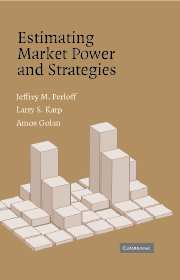Book contents
- Frontmatter
- Contents
- Foreword
- 1 Introduction and overview
- 2 Structure–Conduct–Performance
- 3 Industry Models of Market Power
- 4 Differentiated-Product Structural Models
- 5 Strategic Reasons for a Dynamic Estimation Model
- 6 Dynamic Games Involving Economic Fundamentals
- 7 Estimation of Dynamic Games Involving Economic Fundamentals
- 8 Estimation of Market Power Using a Linear-Quadratic Model
- 9 Estimating Strategies: Theory
- 10 Estimating Strategies: Case Studies
- Statistical Appendix
- Bibliography
- Answers
- Index
10 - Estimating Strategies: Case Studies
Published online by Cambridge University Press: 04 June 2010
- Frontmatter
- Contents
- Foreword
- 1 Introduction and overview
- 2 Structure–Conduct–Performance
- 3 Industry Models of Market Power
- 4 Differentiated-Product Structural Models
- 5 Strategic Reasons for a Dynamic Estimation Model
- 6 Dynamic Games Involving Economic Fundamentals
- 7 Estimation of Dynamic Games Involving Economic Fundamentals
- 8 Estimation of Market Power Using a Linear-Quadratic Model
- 9 Estimating Strategies: Theory
- 10 Estimating Strategies: Case Studies
- Statistical Appendix
- Bibliography
- Answers
- Index
Summary
We now apply the theory developed in Chapter 9 to estimate strategies and market power in airlines and cola markets. First, we estimate the pricing strategies of American Airlines and United Airlines. We assume that the airlines choose only price and that we have a reliable measure of cost. Next, we estimate the strategies of Coca-Cola and Pepsi Cola. This second study is more general than the airlines model in two ways: we assume that the airlines set both price and advertising levels and that the strategies are conditional on exogenous demand and cost variables. Unlike most other studies that estimate strategies, we do not assume that the firms use a single pure strategy, nor do we make the sort of ad hoc assumptions used in conjectural variations models.
AIRLINES GAME
We estimate the strategic pricing behavior of American and United Airlines using the maximum entropy-maximum-likelihood multinomial logit (ME-ML), generalized maximum entropy (GME), and GME-Nash approaches and compare the results. After approximating the airlines' continuous action spaces – price – with a discrete grid, we estimate the vector of probabilities – the pure or mixed strategies – that United and American Airlines choose an action within each possible interval in the grid. We then conduct hypothesis tests. Next, we use our estimated strategies to calculate the Lerner index of market structure. Then, we present estimates of the strategies and demand estimates of United and American Airlines as well as detailed statistics and a battery of hypothesis tests.
- Type
- Chapter
- Information
- Estimating Market Power and Strategies , pp. 235 - 262Publisher: Cambridge University PressPrint publication year: 2007



